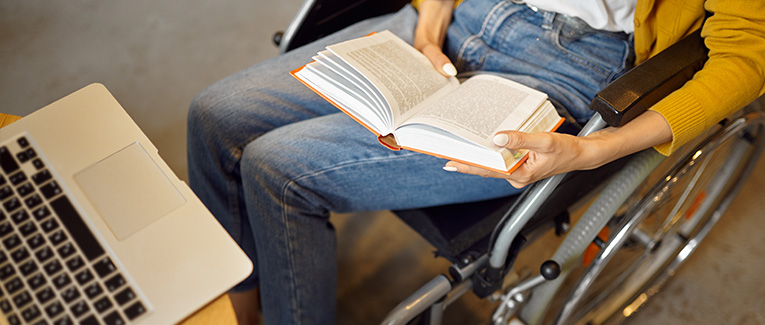
If you’re a student looking to study abroad, but are hesitant to apply to a university because of you would be studying abroad with a disability, then read on.
You can now get end-to-end help for your studies in the U.S., thanks to institutions like the Institute of International Education. Get information, assistance, and support to help ease your worries about student life in the U.S.
Here are some more resources that can help you:
- The Society for Accessible Travel & Hospitality: It’s an educational nonprofit organization that spreads awareness about the travel requirements of students with disabilities. They help students get free access to multiple travel opportunities across the U.S. and other countries.
- ADA National Network: This network is comprised of 10 regional ADA centers across the United States. It helps you get information, training, and guidance about your rights, and how to implement them when need be. ADA’s mission is to “assure equality of opportunity, full participation, independent living, and economic self-sufficiency for individuals with disabilities.”
- The U.S. Department of Education: It helps students with disabilities who are preparing for post-secondary education.
- The U.S. Department of State’s Bureau of Consular Affairs: This bureau helps people with disabilities travel safely in foreign lands.
As opposed to how things were in 2002, when only over 120 Universities in the U.S. offered facilities to students with disabilities, the U.S. Universities of today are promoting accessibility and practicing inclusivity.
Students with disabilities receive:
- Readily available information about accommodations, sign language interpreters, note-takers, different formats, procedures to add time on examinations based on the ability, and more.
- Accessible laboratories, classrooms, modes of transportation, and libraries.
- If you need a personal assistant, the university refers you to community services. They also help you find sighted guides, personal aides, and more.
- Special counseling services for depression, anxiety, and stress.
- Special academic advice and consultation on any kind of hurdle that you may be facing.
These are accessibilities that you’ll get once you reach the country and settle down. But what about traveling, and intercity or interstate travel once you are on your own in the U.S.?
That’s where insurance gets you peace of mind.
Reasons why students with disabilities need travel or medical insurance plan for studying abroad
Student medical insurance is imperative for overseas studies. In fact, in some countries, it’s mandatory. Many universities in the U.S. require a foreign student to have an international student insurance plan for enrollment. Even if your university doesn’t make student insurance mandatory, it’s advisable that all students apply for it.
Top 5 things to know if you are a student with a disability in the U.S.
- You’ll need your post-secondary school to send academic adjustments for you before you enroll in a program at a U.S. University. Academic adjustments are modifications you need to participate in certain activities. If there are any specific adjustments you need based on your disability, you should pre-inform your post-secondary school.
- Understand and be aware that no university can reject your application based only on your disability.
- If the University generally offers accommodation to foreign students, it has to offer the same to students with disabilities at no extra cost. If it doesn’t offer housing facilities, the university must help the students find stable accommodation.
- You’ll need proof and complete documentation regarding your disability.
- Universities do not provide any personal services like readers or assistants for personal use. However, you can always consult the counselors once you are enrolled at the college to seek help for such services.
Try to get these scholarships for studying abroad with a disability in the U.S.
It’s believed that the U.S. is one of the most welcoming countries for studying abroad with a disability, which is certainly good news! But, make sure to keep in touch with important organizations like Mobility International USA, as well as the student services of the university you’ve applied to. It’ll help you get information about things like scholarships and procedures for applying to a specific course.
Some good scholarships for students with disabilities in the U.S. include:
- Alice Chavez Pardini Education Advancement Grant: $2500 for a legally blind student who’s in need of assistance for education. Residents of Alameda, Marin, Contra Costa, San Francisco, and San Mateo in California can apply for this grant.
- Google Lime Scholarship Program: Lime Connect, a non-profit organization in partnership with Google, provides $10,000 worth of scholarships to college students with disabilities. These scholarships are for students of technology and computer science. If you’re eligible to apply for this, go for it. It’s going to cover a lot of your college expenses.
- 1800wheelchair.com Scholarship: 1800wheelchair.com helps students who are facing mobility issues on campus, and awards two scholarships worth $500. The eligibility criteria is that you have to be a high-school senior enrolled in an under-graduate course at a university in the U.S. You should have a 3.0+ GPA and will need to submit an essay or poem on a particular topic to be able to apply for this scholarship.
Some more scholarship programs you can look for in the U.S. are:
- Kristofer Robinson Scholarship Fund
- Lilly Reintegration Scholarship
- Foundation for Science and Disability Student Award Program
- Cleft Palate Foundation Scholarships
The list is quite long. It tells us how welcoming the country is towards students with different abilities. Don’t let anything stop you from applying to a course that you know you can do wonders in. Apply to a university in the U.S. fearlessly, and assert your rights as a student. You deserve it.

